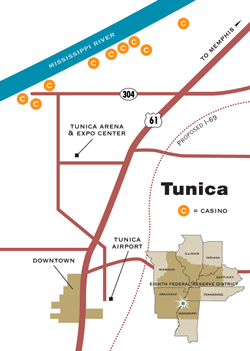Community Profile: Tunica, Miss., Lays Big Bet on the Casino Industry
Signs of prosperity pop up across the flat land of Tunica: nine flashy casinos, an expo center, a new golf course, an outlet mall, a recreation center and other attractions. Long-time residents like to brag about the “Tunica miracle.” The old Tunica, the Tunica of the 1980s and early ’90s, seems like a long time ago. Or does it?
|
|
||
|
Tunica, Miss. |
||
| BY THE NUMBERS | ||
| Population | ||
| City 1,089 (2005) | ||
| County 10,321 (2005) | ||
| County Labor Force | ||
| 4,469 (June 2006) | ||
| County Unemployment Rate | ||
| 8.5 percent (June 2006) | ||
| County Per Capita Income | ||
| $19,567 (2004) | ||
| Top Employers in Tunic County | ||
| Grand Casino | 2,556 | |
| Horseshoe Casino | 2,500 | |
| Sam’s Town Casino | 1,561 | |
| Gold Strike Casino | 1,547 | |
| Fitzgerald’s Casino | 1,130 | |
“There’s no way to forget,” says Clifton Johnson, the Tunica County administrator and a life-long Tunica resident. “I remember when there was nothing here.”
Flash back to the “old Tunica.” Residents had depended for decades on the cotton industry for jobs; the introduction of high-tech farming tools cut the need for actual farmers, however. In 1991, the year before the first casino opened, Tunica County had 15.7 percent unemployment, the highest in Mississippi and 6.8 percentage points higher than the state average.
Now, about 12 million people try their luck every year at casinos here, making Tunica the largest casino market in the Eighth District and the fifth largest in the United States, according to the American Gaming Association. Gamblers can choose from more than 14,000 slots and 400 table games and stay in one of more than 6,300 hotel rooms.
The Tunica casino industry employs about 15,000 workers, most of them getting on-the-job training. “The bottom line is that people have jobs,” Johnson says. “Before, people weren’t working.”
The average annual salary of a Tunica County resident has gone from $12,700 in the early 1990s to $26,000 in 2004, according to the Mississippi Employment Security Commission. The county had just 2,000 jobs in 1992 and almost 17,000 jobs in 2005, according to the security commission. Unemployment is about one-half what it was in the pre-casino days.
Casino development also has had dramatic implications for local government finance. Through the first 10 months of 2006, the 26 casinos in Mississippi had generated almost $245 million in tax revenue for state and local governments, according to the Mississippi Gaming Commission. In 2005, tax revenue totaled about $254 million, despite Hurricane Katrina knocking out the Gulf Coast casinos for nearly four months.
Tunica gaming revenue is subject to a 12 percent tax: 8 percent from the state and 4 percent from Tunica County. The Tunica County Board of Supervisors decides how to spend the local money. County officials say that Tunica has benefited from millions of dollars in capital projects since 1992, including:
- the 48,000-square-foot Tunica Arena and Expo Center, which attracts more than 200,000 visitors every year for trade shows and other events. Built in 2001, this $24 million venue already is undergoing a $5 million expansion;
- Tunica RiverPark, which includes a museum, aquarium, nature trails and a deck overlooking the Mississippi River. The $26 million RiverPark has attracted more than 100,000 visitors over the past two years;
- the Tunica Airport, which completed a $38 million expansion in 2000. Charter flights carry passengers to Tunica from at least 12 states;
- the Tunica County Library, which has doubled in size at a cost of $1.5 million;
- the Tunica National Golf and Tennis Center, which opened in March 2004; and
- the G.W. Henderson Sr. Recreation Complex, which features a 38,700-square-foot county sports complex with an eight-lane swimming pool, basketball courts, a boxing ring and a workout facility.
  |
| The bright lights of the Grand Casino (above) contrast sharply with a pastoral scene several miles west of downtown. |
“We wouldn’t have been able to do any of this without gaming,” Johnson says.
In 1997, Tunica County cut property taxes by 25 percent. Since the first casino opened, the county has allocated more than $100 million to road construction and improvement, $40.8 million to school improvements, $28.2 million to water and sewer upgrades, $13.2 million to police and fire protection, and $5 million to housing rehabilitation and support services for the elderly and disabled.
“There’s a feeling among some critics that if you make gambling legal, the entire town will go to ruin,” says St. Louis Fed economist Tom Garrett, who has written about the gambling industry. “That just isn’t the case.”
State lawmakers in 1990 made casino gambling legal for Mississippi counties that lie along the Gulf Coast and on major waterways, such as the Mississippi River. The first Tunica casino, Splash, opened in 1992. Lady Luck opened 11 months later, and other casinos followed: Harrah’s in 1993; Treasure Bay, Hollywood, Circus Circus (now Gold Strike) and Fitzgerald’s in 1994; and so on.
Gold Strike added a 31-story hotel, the tallest building in Mississippi, in 1997. The Horseshoe Casino opened in 1995 and completed a $40 million expansion in 2000. Casino owners built all this on their own, without a penny of tax increment financing or other subsidies.
  |
| TOP: Although casinos are king now in Tunica, there’s still plenty of room for cotton, too. The harvest was in full swing last fall in the northern part of the county. BOTTOM: The Schweikert family of Olive Branch, Miss., visits RiverPark, a complex on the Mississippi River that includes a museum, aquarium and nature trails.
|
“That’s the interesting thing, that in this age of subsidies and companies making all these demands, the casino industry has traditionally received fewer economic development incentives than other industries,” Garrett says. “Of course, usually, there is a segment of the local population that doesn’t support gambling, and the gambling industry is just glad to be there.”
“There has been a real vision”
Why don’t more towns—especially struggling ones, as Tunica was—open casinos, build golf courses and outlet malls and then sit back and wait for prosperity? Well, for one thing, it isn’t that easy.
What Tunica did is more complicated than just legalizing the lottery or putting a few hundred slot machines on a riverboat. Tunica, about 30 miles south of Memphis, built a destination resort. It did it in just a few years, and it did it from scratch.
Bob McQueen, the general manger of Fitzgerald’s Casino, credits forward-thinking public officials for helping to pull off the “Tunica Miracle” that the county likes to advertise.
John Osborne, the general manager of Hollywood Casino, agrees: “There has been a real vision if you look at the investment on infrastructure. Look at it all—the school improvements, the recreation centers, the museums, everything.”
The casinos continue to invest in Tunica. Fitzgerald’s plans to renovate its hotel lobby and guest rooms, and add suites throughout the hotel; the Horseshoe hopes to put in a Starbucks coffee shop; Resorts Casino is renovating its exterior; and the Sheraton will open a showroom to attract variety acts.
The next phase in the Tunica transformation will be in the area of residential construction. Ask Matt McCraw, the president of Covenant Bank in downtown Tunica, whether Tunica is just a southern suburb of Memphis and he smiles. “Tunicans don’t think so,” he says. “But it’s coming this way.” Over the next five years, Johnson says 3,000 housing units will be built in Tunica County. The additional housing may help bring more retail stores and chain restaurants to Tunica, McCraw said.
Along with housing, and possibly more retail, Tunica hopes to attract more manufacturing jobs to the area. In late 2005, the county designated a 2,200-acre site for industrial development, on a cotton field near Casino Row and the intersection of highways 61 and 304. Johnson says the county wants to land an automobile assembly plant on the site.
In some ways, the old Tunica really does seem like a long time ago. Farming, once the lifeblood of Tunica, is just a $70 million business—a fraction of what gambling generates. “Some people don’t like gambling,” Johnson says, “but it has given people here some hope. It is responsible for providing many people with a better life.”
Views expressed in Regional Economist are not necessarily those of the St. Louis Fed or Federal Reserve System.
For the latest insights from our economists and other St. Louis Fed experts, visit On the Economy and subscribe.
Email Us


